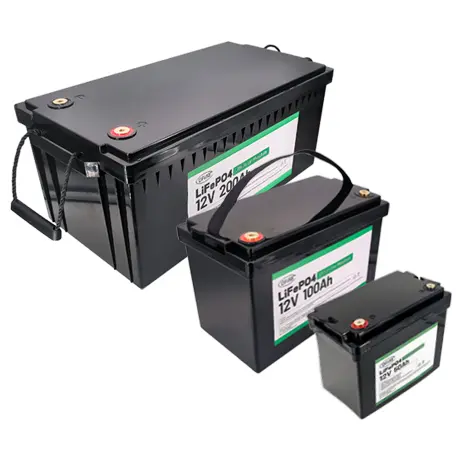Lithium boat batteries have gained popularity in recent years due to their superior performance and numerous advantages over traditional lead-acid batteries. However, with a wide range of available options, choosing the best lithium boat battery can take time and effort. In this comprehensive guide, we will explore the key characteristics of lithium boat batteries, discuss the factors to consider when selecting, delve into the different types available, and compare them to help you make an informed decision.
Part 1. Lithium boat battery characteristics
Lithium boat batteries offer several distinct characteristics that set them apart from other battery types. Understanding these features can help you evaluate their suitability for your boating needs.
- 1. Energy Density
One of the primary advantages of lithium boat batteries is their high energy density. They can store more energy per unit of weight than lead-acid batteries, making them lightweight and compact. With a higher energy density, lithium batteries can power your boat for longer durations, allowing you to enjoy extended trips on the water without worrying about battery depletion.
- 2. Cycle Life
Cycle life refers to the number of charge and discharge cycles a battery can undergo before its performance significantly deteriorates. Lithium boat batteries excel, offering a significantly higher cycle life than traditional batteries. They can endure hundreds or even thousands of cycles, providing reliable power for an extended period. This longevity makes them a cost-effective choice in the long run, as they require less frequent replacement.
- 3. Charging Efficiency
Efficient charging is another notable characteristic of lithium boat batteries. They have a higher charge acceptance rate, allowing them to recharge faster. Lithium batteries can also handle higher charging currents, enabling quicker power replenishment when connected to a suitable charging system. This feature is especially beneficial for boat owners who want to minimize downtime and maximize their time on the water.
- 4. Voltage Stability
Maintaining a stable voltage throughout the battery’s discharge cycle is crucial for smoothly operating your boat’s electrical systems. Lithium boat batteries exhibit excellent voltage stability, ensuring a steady power supply to your onboard devices. This stability prevents voltage drops, which can lead to equipment malfunctions and performance issues.
Part 2. Factors to consider when choosing lithium boat batteries
Selecting the best lithium boat battery for your requirements requires considering several key factors.
- 1. Battery Capacity
Battery capacity refers to the energy a battery can store and deliver. It is crucial to assess your power demands and choose a lithium boat battery with an adequate capacity to meet those requirements. Consider the electrical devices and systems on your boat that will power the battery and calculate their energy consumption to determine the suitable capacity.
- 2. Size and Weight
The size and weight of the battery can impact your boat’s overall weight distribution and performance. Lithium boat batteries are known for their compact and lightweight design, making them an excellent choice for boats with limited space. Ensure the battery’s physical dimensions and weight align with your boat’s specifications and installation requirements.
- 3. Safety Features
Safety should always be a top priority when selecting a battery for your boat. Look for lithium boat batteries with built-in safety features such as overcharge protection, short circuit protection, and thermal management systems. These features ensure the battery’s safe operation and minimize the risk of accidents or damage.
- 4. Battery Management System (BMS)
A battery management system (BMS) is essential to lithium boat batteries. The BMS regulates the battery’s charging and discharging processes, preventing overcharging, over-discharging, and other potential issues. A robust and reliable BMS enhances the overall performance and longevity of the battery, making it a crucial factor to consider during the selection process.
Part 3. Types of lithium boat batteries
There are different types of lithium boat batteries available in the market. Understanding the variations and their specific characteristics can help you choose the most suitable option for your boating needs.
Lithium Iron Phosphate (LiFePO4)
Lithium Iron Phosphate (LiFePO4) batteries are known for their excellent safety profile and long cycle life. They are highly resistant to thermal runaway, making them less prone to overheating or catching fire. LiFePO4 batteries are also environmentally friendly and have a lower risk of chemical leakage. They are famous for boaters seeking a reliable and durable lithium battery option.
Lithium Cobalt Oxide (LiCoO2)
People commonly use lithium-cobalt oxide (LiCoO2) batteries in consumer electronics due to their high energy density. While they provide a compact and lightweight solution, LiCoO2 batteries have a shorter cycle life than LiFePO4 batteries. They are suitable for boaters who prioritize high energy density and have less stringent requirements for cycle life.
Lithium Manganese Oxide (LiMn2O4)
Lithium Manganese Oxide (LiMn2O4) batteries balance safety, cycle life, and energy density. They offer a moderate energy density and a longer cycle life than LiCoO2 batteries. LiMn2O4 batteries are a reliable choice for boaters who value performance and durability.
Lithium Nickel Manganese Cobalt Oxide (LiNiMnCoO2)
Lithium Nickel Manganese Cobalt Oxide (LiNiMnCoO2), also known as NMC batteries, provide a high energy density and good cycle life. They offer a versatile solution for various boating applications, balancing power and endurance. NMC batteries are popular for boaters requiring a well-rounded lithium battery option.
Specific Boat Types for Each Battery
To provide a more precise understanding of which boat types each lithium battery is suitable for, here is a breakdown:
- Lithium Iron Phosphate (LiFePO4): Recommended for larger boats, yachts, offshore vessels, and boats where safety and long cycle life are paramount.
- Lithium Cobalt Oxide (LiCoO2): Ideal for smaller boats, fishing boats, personal watercraft, and boats with limited space or weight restrictions.
- Lithium Manganese Oxide (LiMn2O4): Suitable for recreational boats, pontoons, sailboats, and boats that require a balance between safety, cycle life, and energy density.
- Lithium Nickel Manganese Cobalt Oxide (LiNiMnCoO2): Well-suited for high-performance, electric, and boats with significant power demands.
Part 4. Compare lithium boat batteries
To make an informed decision when choosing a lithium boat battery, you must compare different types based on their characteristics, advantages, disadvantages, and suitable boat types. The following table provides a concise comparison of different lithium boat batteries:
|
Lithium Battery Type |
Advantages |
Disadvantages |
Suitable Boat Types |
|
Lithium Iron Phosphate (LiFePO4) |
Exceptional safety profile |
Lower energy density compared to other lithium battery types |
Larger boats |
|
Lithium Cobalt Oxide (LiCoO2) |
High energy density |
Less forgiving in terms of safety compared to other lithium battery types |
Smaller ships with limited space or weight restrictions |
|
Lithium Manganese Oxide (LiMn2O4) |
Good balance between safety, cycle life, and energy density |
Moderate energy density compared to other lithium battery types |
Recreational boats, pontoons, sailboats |
|
Lithium Nickel Manganese Cobalt Oxide (LiNiMnCoO2) |
High energy density and good cycle life |
Higher cost compared to other lithium battery types |
High-performance boats, electric boats, and boats with significant power demands |
Part 5. FAQs
-
What are the problems with lithium batteries in boats?
Common problems with lithium batteries in boats include potential thermal runaway, damage from improper charging or discharging, and the need for specialized chargers and monitoring systems. -
What is a good C rating for a lithium battery?
A C rating of 20C or higher is suitable for high-performance applications, while around 10C may suffice for most recreational boating needs. -
What type of battery is best for a boat?
The best battery type for a boat depends on size, power requirements, and intended use. Many people often prefer lithium batteries due to their high energy density, longer lifespan, and lighter weight. The specific type will depend on safety, energy density, and cost considerations. -
Are lithium batteries any good on boats?
Lithium batteries offer boating industry advantages, including higher energy density, longer lifespan, faster charging times, lighter weight, and better Efficiency. Proper selection, installation, charging, and monitoring are crucial for maximizing performance and safety.
Related Tags:
More Articles

Where to Find the Right 18650 Battery Wholesale?
Discover how to choose a reliable 18650 battery wholesale supplier, compare prices, ensure safety, and avoid common buying mistakes.
18650 Battery Short Circuit: Risks and Safety Tips
Discover what happens during a 18650 battery short circuit, warning signs, and how to avoid fire, damage, and hazardous failures in your devices.
LiPo Battery Discharge Rate Guide & Calculation Tips
Understand LiPo battery discharge rates, C-ratings, and how to calculate max current. Essential guide for RC, drones, and electronics users.
High‑Capacity 3S LiPo Batteries: 5000 mAh vs. 10000 mAh
Compare 3S LiPo 5000mAh vs 10000mAh batteries by weight, power, and use. Find the best fit for your drone, RC car, or boat setup.
Top 5 Applications for Small 3S LiPo Batteries
Small 3S LiPo batteries power drones, RC gear, wearables, and robotics with high energy and low weight. Making them ideal for compact electronics projects.




